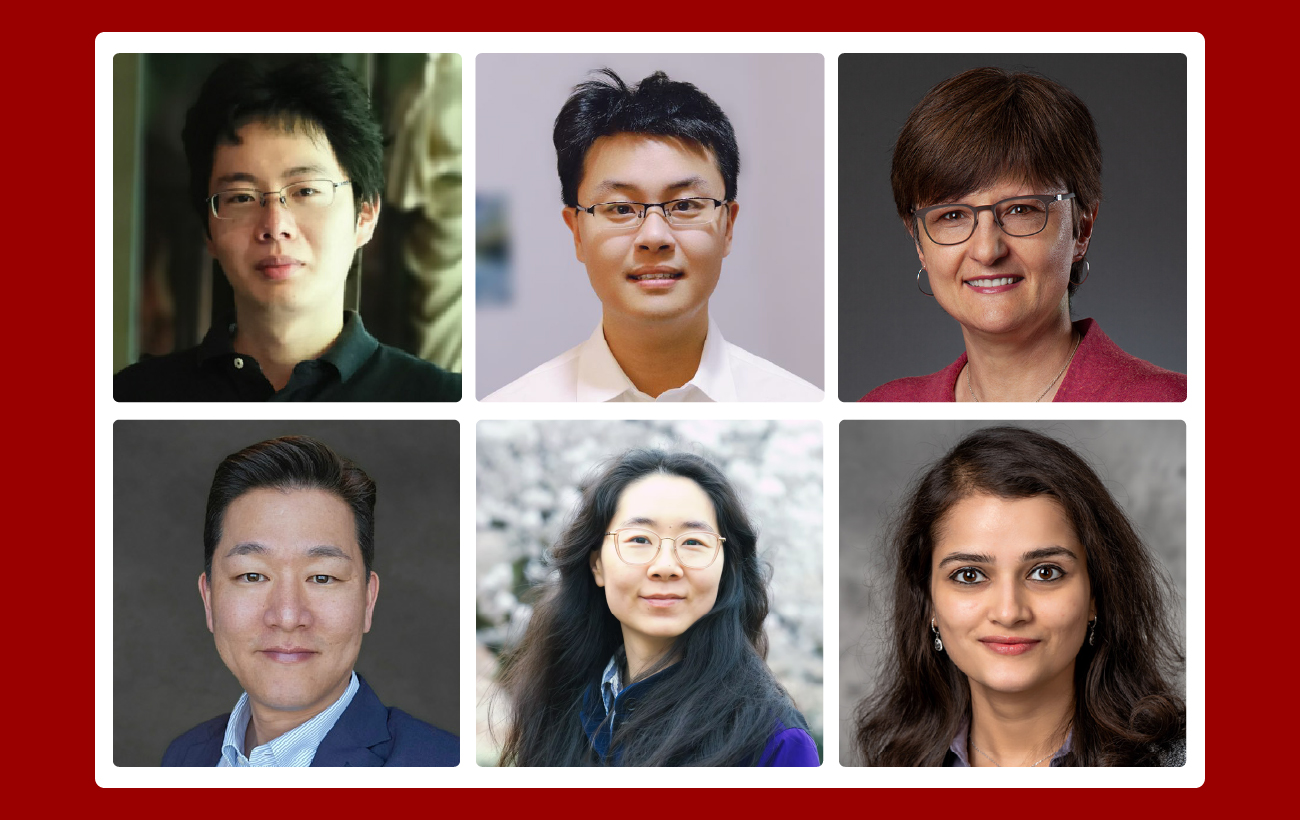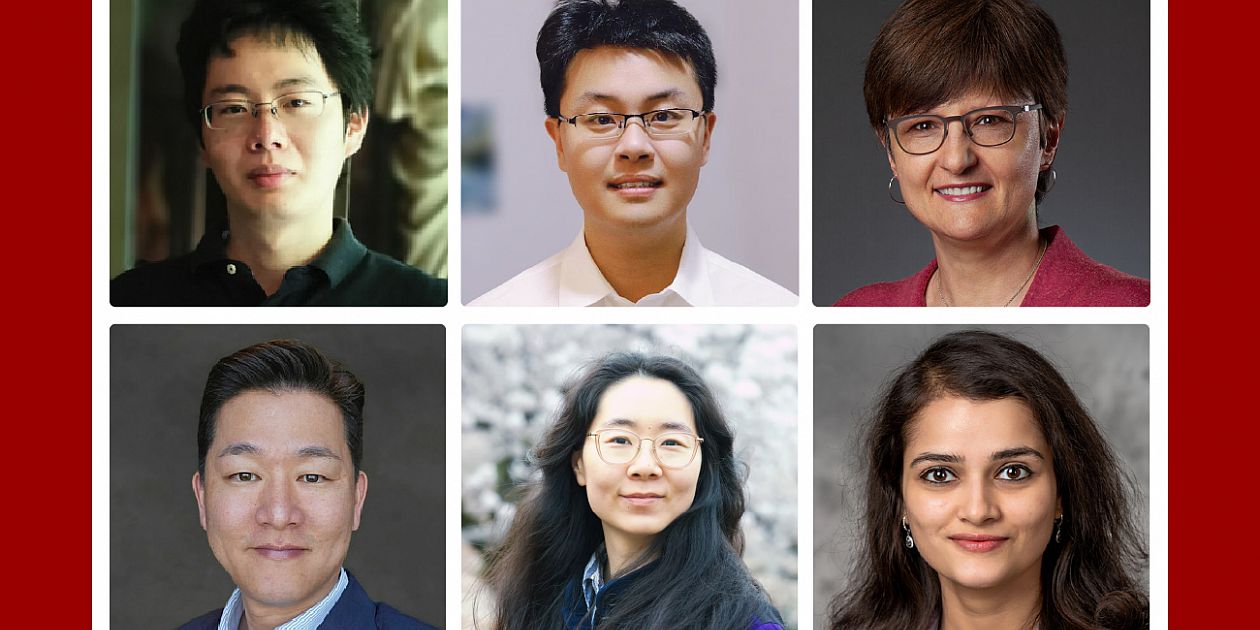 The Luddy School welcomes six new faculty for the 2025-26 academic year.
The Luddy School welcomes six new faculty for the 2025-26 academic year.
Could AI chatbots, like social media before them, escalate mental health risks? Kristina Lerman, a new professor of Informatics at the Luddy School of Informatics, Computing, and Engineering says yes, and her research backs it up.
Lerman is one of Luddy’s six new faculty for the 2025-26 academic year. Lerman, Assistant Professor Madhurima Vardhan and Assistant Professor Kaiwen Sun have joined the Informatics faculty. Professor Byung-Cheol Min and Assistant Professor Jiangpeng He are part of the Computer Science department. Assistant Professor Bingchen Deng is in Intelligent Systems Engineering.
Their research ranges from mental health risks to cutting-edge robotics work to human-computer interaction as it relates to children and families, to microelectronics and optoelectronics based on emerging quantum materials, and more.
“It is exciting to welcome Byung-Cheol Min and Jiangpeng He to Computer Science at a time when AI is transforming every aspect of computing and its applications,” said Yuzhen Ye, Computer Science chair and professor of Informatics and Computer Science. “Their arrival significantly strengthens our department’s research and teaching expertise across multiple areas, including robotics, biomedical and healthcare research, and AI more broadly.”
Weihua Guang, professor and interim chair of the Intelligent Systems Engineering department, praised Deng’s work in microelectronics.
“Dr. Deng’s research focuses on advanced semiconductor materials and micro/nanoelectronics, particularly ultra-thin ‘2D materials’ like graphene and black phosphorus. By studying how these materials behave and finding ways to harness their unique properties, he works toward creating smaller, faster, and more energy-efficient electronic and photonic devices.”
Here’s more information on the new faculty:
****
Lerman, who has studied social media for 20 years, is focused on the relationship between technology and society from a public mental health perspective. She said the potential danger has escalated in the past three to four years as young people increasingly enter emotionally immersive relationships with artificial agents.
“I started to suspect that the technology – and by extension I and all the students I trained – are implicated in an acute and growing mental health crisis,” she said.
Lerman details the risk in an invited guest post on Jonathan Haidt’s popular After Babel Substack, “Artificial Intimacy: The Next Giant Social Experiment on Young Minds.” She wrote it with Minh Duc Chu, a University of Southern California Ph.D. student, who was also the co-author of a study of interactions with AI chatbots.
They analyzed more than 30,000 conversational snippets from users on Reddit. They also analyzed how users spoke to AI and how the chatbots responded.
Their paper was also featured during a recent Dr. Phil podcast, “Your child’s new best friend – a bot!”
In their paper, Lerman and Chu said these snippets offered “valuable insight into what users find memorable or unsettling.” They said bots mirror emotions and create deep emotional attachments to the point where some children might trust an AI chatbot more than their peers.
Lerman and Chu said a lot of the interaction was intimate, becoming “romantic or even erotic.” Bots offered sympathy to sad users; they celebrated when users were happy; they became defensive when users were angry.
Using a mechanism psychologists call “emotional mirroring,” bots made users feel seen, heard and validated. The result – media reports suggest people are forming deep emotional attachments to bots, some even calling it love.
Previous research has focused on young adults, but little is known about how children and teenagers respond to emotionally intelligent AI, and how it shapes their behavior and development.
How big is the crisis?
The parents of Adam Raine, a 16-year-old who died of suicide in April after consulting with ChatGPT about ending his life (contact started with Lerman asking ChatGPT for schoolwork help), have recently filed a lawsuit as one of the first known cases to be brought against OpenAI for wrongful death.
Lerman and Chu conclude the risk involves individuals and society. What happens when powerful companies have access to people’s psychological data, including their deepest fears and most private desires?
“As emotionally responsive machines become more central in our lives,” they write, “we must ask whether they are supporting our ability to connect – or eroding it. Whether these tools elevate us or diminish us depends on the choices we make now.”
*****

Luddy Hall.
Credit: IU Communications
Sun said she was drawn to Luddy’s “unique interdisciplinary approach and its focus on using technology to make a real difference in society.”
Her research focuses on the intersection of Human-Computer Interaction, Usable Security and Privacy, and Human-Centered AI centered on children and families.
“I love Luddy’s collaborative environment, which is the perfect place for my kind of research,” she said.
Sun said she hopes to build an impactful research program at Luddy focused on the lived experiences of diverse populations, as well as mentor students and collaborate with colleagues.
“I want to use my expertise in human-centered computing to explore how we can design technology that is safe, privacy-protective, and inclusive. I’m excited to contribute to the school’s continues growth.”
*****
Deng’s research focuses on microelectronics and optoelectronics based on emerging quantum materials. He said unlike classical electronic materials such as silicon, quantum materials “exhibit remarkable quantum mechanical properties that enable new possibilities for devices.” That includes two-dimensional graphene, one-dimensional quantum wires, and zero-dimensional quantum dots.
“I aim to both explore fundamental sciences in low-dimensional quantum systems,” he said, “and leverage their desirable properties in practical device applications.”
Deng said the Luddy School’s huge investment in microelectronics and new degree programs in the area “strongly align with my research agenda.”
“I’m excited to be part of the effort to fuel such initiatives. Drawing on my interdisciplinary background in engineering, physics, and chemistry, as well as my diverse experience in academia and industry, I look forward to building collaborations across the campus that will drive profound scientific discoveries and help transform them into future technologies.”
Guang said Deng’s “expertise strengthens the department’s focus on next-generation semiconductor technologies and opens exciting opportunities for collaboration at the intersection of engineering, materials, and physics.”
*****
Min’s research is at the intersection of multi-robot systems, human-robot interaction, and robot learning. He designs and develops algorithms and systems that enable robots to learn intelligently from their surroundings, interact naturally with people, and collaborate effectively in multi-agent teams.
He said he’s developing methods for distributed control, reinforcement learning, preference learning, and learning from demonstration –approaches that allow robots to adapt in complex and dynamic environments.
“My work addresses practical challenges such as enabling a single robot to autonomously navigate a crowded environment or orchestrating teams of robots and humans working together to accomplish shared goals like as search and rescue and environmental monitoring.”
Min said the Luddy School’s strong interdisciplinary foundation, transformative research and education, and culture of collaboration were big draws. So was the school’s internationally renowned reputation in artificial intelligence and robotics.
“The school’s integration of Computer Science, Intelligent Systems Engineering, Informatics, and Information and Library Science creates an ideal ecosystem where robotics research can thrive and connect seamlessly with diverse domains,” he said.
Min said Luddy’s resources will support his work in combining robotics and AI to achieve capabilities once thought impossible.
“Equally important, Luddy’s recent commitment to expanding its engineering and robotics programs offers an unparalleled opportunity for my research to thrive, explore new directions, and make a broader impact.”
Min said his priority is to help establish robotics as a signature strength of the school, building a distinctive brand and reputation in areas such as human-centered robotics. He wants to position Luddy as a leader where “robotics research not only advances theoretical foundations, but also delivers practical solutions to pressing societal and scientific challenges.”
He said he wants to foster deep, interdisciplinary collaborations across the university to address robotics problems from multiple perspectives. He said he’s also committed to mentoring students and helping them discover their own roles and contributions to society.
“I aim to provide them with the theoretical knowledge and technical skills to become the next generation of roboticists – capable of creating innovative technologies that deliver meaningful real-world impact.”
*****
Vardhan is a computational scientist specializing in artificial intelligence-driven high performance computing applications for biomedicine. She’s won multiple awards for her work in cardiovascular disease and diagnosis.
Jiangpeng He’s research focuses on AI for healthcare and AI-powered image-based dietary assessment.
